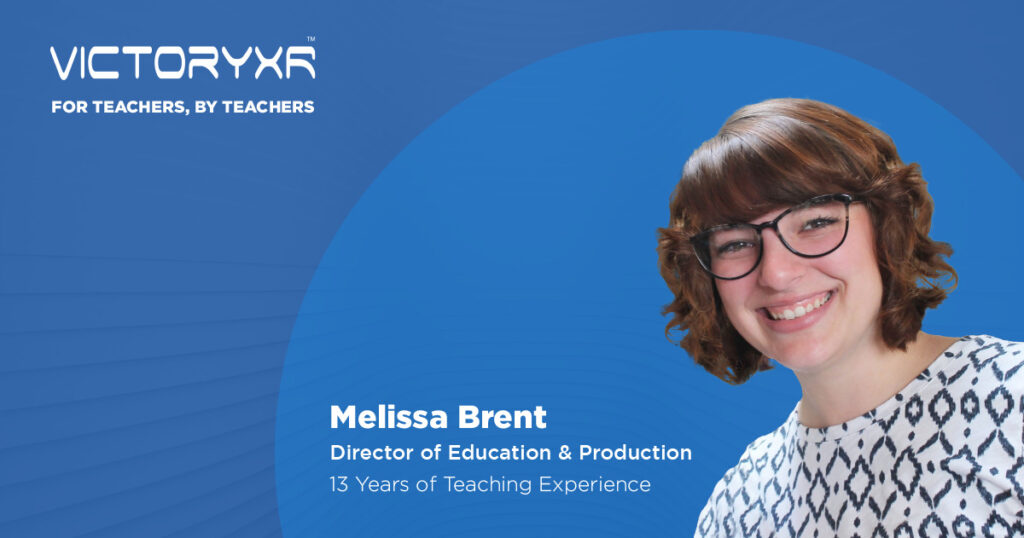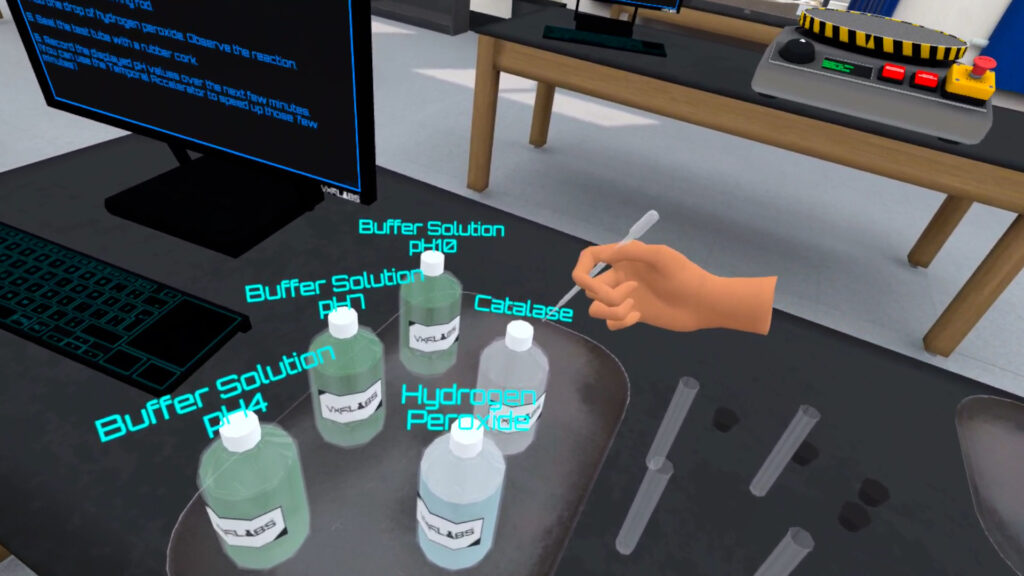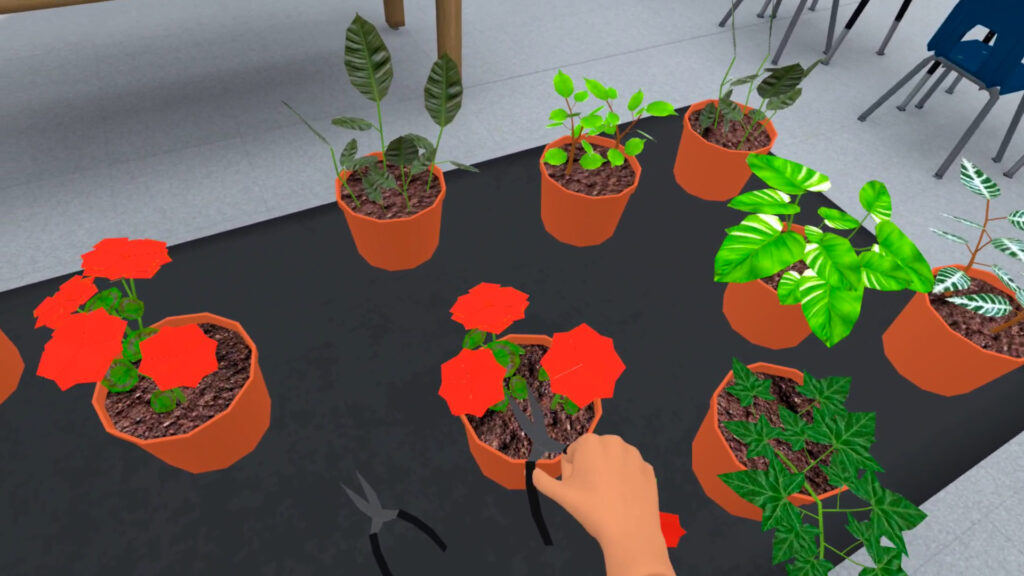An Interview with Melissa Brent: Director of Education and Production at VictoryXR

VictoryXR is dedicated to making content that helps make the lives of teachers easier. This is why we have an entire education department to consult on every product. Our VR content is made for educators, by educators.
Marketing Lead, Cassie Hauschildt, sat down with our Director of Education and Production, Melissa Brent, to discuss how having educators involved in the process helps create even better content.
Cassie: Thank you for sitting down with me today. To start, can you tell us what initially drew you to teaching?
Melissa: I think brains are fascinating. I want to know everything about what they can do and how they do it best.
Cassie: And now you work for VictoryXR. So that was a shift but brains are obviously still involved. Tell me about why you’re excited about working for VictoryXR. You’ve been here for a while, but what keeps that excitement going?
Melissa: This is the newest way to access content, and in accessing content, we acquire knowledge and in acquiring knowledge we retain knowledge and it just comes right back to brains. But what I have found in studying early childhood is I’m just most fascinated by the concept of playing. The fact that play has been proven over and over to be the most efficient way to retain information. VictoryXR gives me a chance to write educational content that involves playing.
Cassie: You just mentioned early childhood, that’s your specialty but obviously we can’t be putting a VR headset on toddlers.
Melissa: No.
Cassie: Does that knowledge still carry through to middle schoolers, high schoolers, and adults? I mean, obviously, we always want our kids to grow up but do their brains ever grow up?
Melissa: It does. And no they don’t, that’s the best part. So instead your brain chemistry will always respond to the same type of stimulus the same way. So if you are doing something that is pleasurable and fun and enjoyable, your brain is going to respond the same way to that pleasure as it would any other kind. So, by making learning the access point for pleasure, like an engaging learning environment, and engaging learning experience, that learning triggers the brain in the same exact way as it did when you were three. The difference is in adulthood, we have a different set of motivation and a different set of where we find value. So we sort of talk ourselves out of joy and fun, a lot of the time by mistake, in an attempt to be a very serious student in a very serious learning environment. You can’t cram information into your brain with seriousness. You can study something until the end of days, but if you’re not enjoying it, it’s a lot less likely to stick.
Cassie: Is that why I can read the same sentence in a textbook over and over and not retain it, but the minute I go in VR and do it physically, I remember?
Melissa: That’s exactly why.
Cassie: One thing that’s unique about VictoryXR is we really do value educators and teachers and their experience and knowledge. And that’s why we have an education team, who’s at the forefront of creating all of our content.
Melissa: As Director of Education and Production we sort of crammed those two thought processes together as they should be. And that’s where they belong. Because in order to create quality educational content you need an educator, But in order to create this quality educator, you need a production line in our developers. So working closely with them is my favorite part of the job. I just get to make things come to life even though I’m not the one actually writing code,
Cassie: Would you say that there’s not a bit of our content made that doesn’t have an educator’s eyes on it before going into coding?
Melissa: Not one single item walks through to our developers without hitting education first.

Cassie: We’ve put a lot of time now into our new VXRLabs, can you give us a short rundown on what VXRLabs does differently that’s going to be better for everyone, both students and teachers?
Melissa: Absolutely. So, we have asked teachers on the team how this should function. One of the first things we wanted to do is to make sure was that there is some way of observing and documenting something that would happen in the headset. That’s not something that is easy to do. What we have to do in order to ensure that these were quality educational experiences and not just games is set up a system of documentation.
So our activity log functions in that way, it’s an itemized receipt of everything that’s happening in a headset experience and it’s sent back to an instructor of record. And from there, the instructor of record gets to take that analyze it and make their own distinctions on what their student learned. Because y’all know your students best, We’re not here to say “This student broke this many beakers and therefore has no idea what’s going on.” Because you wouldn’t know whether that’s the case or not, you need to interpret their data about us. Maybe that student just didn’t have enough time to play and explore the space before they started the activity. There are a million reasons why kids do what they do.
Cassie: Is VictoryXR’s end goal to replace teachers with VR?
Melissa: No, No, we are here to make value out of experiences that are less valuable in real life. To find value in things that don’t work and make it better, for example, something super dangerous. I don’t want my students playing with Bunsen Burners at 12 years old. Maybe a teacher is nervous about implementing those in the classroom, but not in VR.. And Bunsen Burners are expensive. So if you’re gonna have 10 of them in a classroom, that’s already a ton of money saved, just by one license purchased in the VXRLabs App, The best part about labs and the second part of why we’ve built it the way we’ve built it is because it’s as authentic and real using physics and full functionality as possible. So, the flame looks like a flame. It doesn’t feel like a flame, but it looks like a flame, and it acts like a flame. Those are the things that we want out of our simulations, is to emulate with as much authenticity while cutting corners where corners need to be cut.
So, time lapse is an option and something that we’ve built into our spaces, you don’t have to wait for something to boil. You can fast forward. That’s the type of stuff that we want to do. That will improve the overall experience. Students don’t have to track data over a week, they can cram that week into a 15 minute session.
Cassie: But they’ll still see that time progressing so they’ll still understand the time that’s moving, it’ll just be more instantaneous.
Melissa: And it tracks the same data for them so they’re watching the experience, they’re getting the growth of their plant, for example, measured in a way that they can track so that they don’t lose any aspects of learning at all. They just get a better version of the experiment.

Cassie: We’ve discussed a lot of hands-on subjects such as science but I’m not a science person. We might have people who aren’t science teachers. Can they still utilize this?
Melissa: Yes, that’s the best part. So in addition to our science content, we also are in the process of building out as many different subjects across the board. We are not strictly a one-subject pony. We want to be in every subject. So, we have our escape rooms, which are sort of a templated experience in the sense that we have created a series of puzzles related to particular topics and since puzzles can be applied to any topic that opens up the world for custom builds for most popular topics. Our Great Gatsby escape room is the one recently been released. So we’re putting some serious emphasis on literature and language.
In math, we have created a portable graphing solution. So in any space you enter in VXRLabs, you can pull up our data population graph and you can essentially populate some data and there and see it visually in 3D. That’s the part that has the highest impact.
Cassie: What if you don’t have what someone needs but they know what they need?
Melissa: Love that question. We’re so easy to reach. Maybe too easy. We want your ideas, we want to know what your students need. We want to know what you feel would benefit from VR and custom builds are our favorite thing to do.
Cassie: New technology is scary.
Melissa: It is.
Cassie: If a teacher signs up with VictoryXR, are they just going to get a headset and then be left alone to figure it out?
Melissa: That’s the best part and the most important part about VictoryXR. The fact that we are a small team which is led by educators. We know about whether the students get what they need out of our experiences, we are available. We host training sessions, we’re very quick when answering emails. There’s no shortage of assistance. And all of our help documents are available on VXRNexus. So, should you need one of us at one of the rare times you’re not able to reach a member of the team, you can access these instructional documents at any point.
Cassie: Will the Education Team help a teacher learn to implement the product in their existing curriculum?
Melissa: That’s our favorite thing to do. Please reach out. We love to tell you where this belongs in your curriculum. We love to tell you how to keep your curriculum exactly as it is and make it better. We do not want to offer you a prepackaged solution for curriculum. That’s of very little value. We want to offer. assets, supplements things that are going to make every less of it.
Cassie: So no one has to amend their existing lesson plans?
Melissa: Please don’t. when you get what you get out of it which is a lot and continue discussing in your classrooms. That’s exactly what we want.
Cassie: Thank you so much, Melissa.








